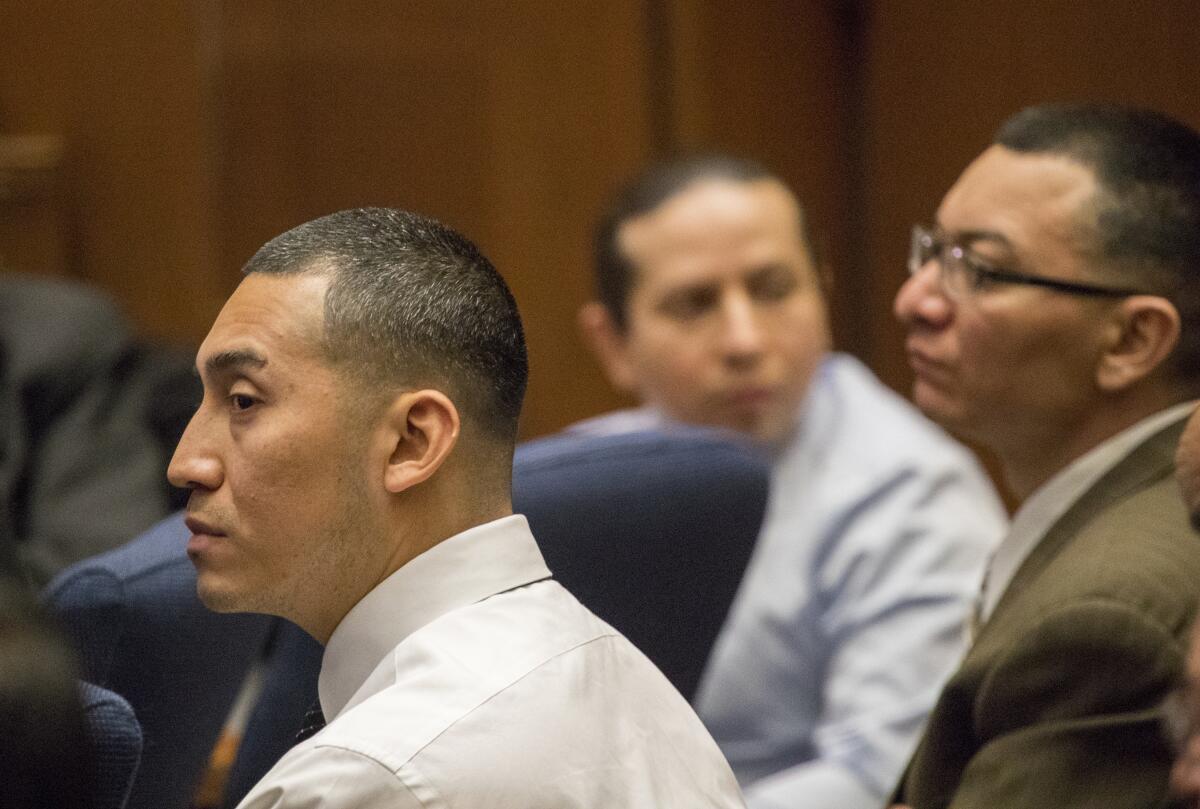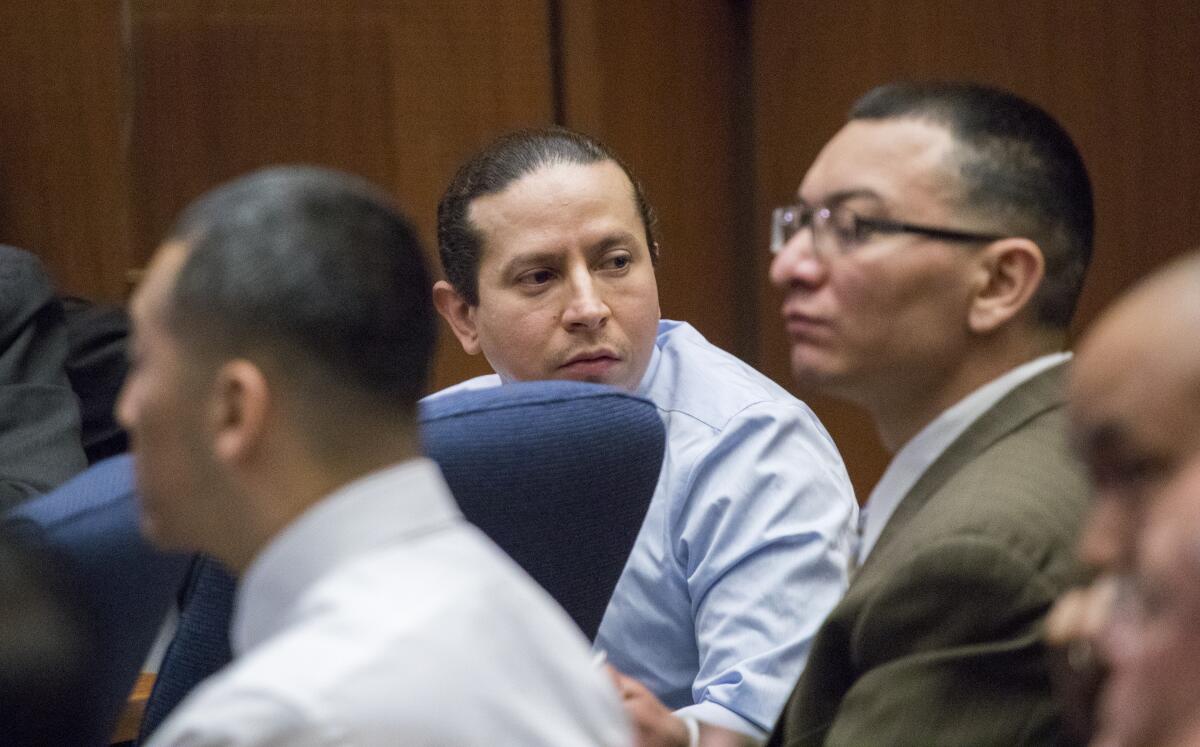Two decades after a girl’s murder, three MS-13 members found guilty

- Share via
Three members of the MS-13 gang were found guilty Thursday of murdering a girl in 2001 on a hillside in Elysian Park.
The jury’s verdict laid to rest questions of who was responsible for a crime that went unsolved for a decade and then dragged through the courts for another.
Melvin Sandoval, 42, and Santos Grimaldi, 39, were convicted of first-degree murder in the death of the 13-year-old girl, Jacqueline Piazza. Because the jury found that Sandoval and Grimaldi murdered Jacqueline in the commission of a rape and while committing a lewd act on a child, the men must be sentenced to life in prison without the possibility of parole.
Rogelio Contreras, 44, was convicted of second-degree murder. The jury found that all three men killed Jacqueline for the benefit of their gang, MS-13.
Superior Court Judge Larry P. Fidler scheduled their sentencing for May 13.
Another MS-13 member, Jorge Palacios, was convicted in 2018 of murdering and kidnapping Jacqueline. Now 43, he is serving life without the possibility of parole.
Jacqueline had run away from her family’s home in Whittier and ended up on the streets of Los Angeles’ Westlake district when, on the afternoon of June 27, 2001, she met Palacios a few blocks west of MacArthur Park. Palacios was selling drugs there, according to an appellate decision that summarized the evidence in his trial, and for a reason authorities could never discern, believed the teenager was a “chavala,” or enemy of his gang.
Palacios and his girlfriend threw Jacqueline to the ground and beat her, then told Sandoval and Grimaldi to take the girl somewhere, rape her and “get rid of her,” a witness testified at trial.
With Jacqueline stashed in the trunk, Contreras drove Sandoval, Grimaldi and a female MS-13 member to Elysian Park, where Grimaldi and Sandoval raped the girl, according to testimony. She was shot twice in the head, her body left on a hillside in the dark.
The case went unsolved for a decade, until the female MS-13 member told detectives what she had witnessed. DNA evidence from Jacqueline’s body linked Grimaldi and Sandoval to her rape, and another witness told authorities that Sandoval, Grimaldi and Contreras had told him details of the crime years later. Contreras, the witness testified, had once said he could “still see her ghost in my car.”

Palacios, Sandoval, Grimaldi and Contreras were charged with the girl’s murder in 2012. It emerged during the investigation that beginning around 2004, Palacios had worked as an informant for the FBI and had been used to infiltrate MS-13 cells in Nebraska, Maryland, Virginia, Florida and Indiana, according to an agent’s testimony in a Nebraska prosecution. He helped agents collect evidence in drug and gun cases and a murder-for-hire plot.
For his work, the bureau paid Palacios more than $300,000, the agent said. Asked by a defense attorney if Palacios had made more money selling drugs — his source of income prior to becoming an informant — “or more money working for the FBI,” the agent responded: “I don’t know.”
The bureau continued using Palacios as an informant after being told in early 2009 that he was suspected of having killed a 13-year-old girl, the agent testified.
Palacios was tried separately from his co-defendants on the charge of kidnapping and murdering Jacqueline. He was convicted, but a jury deadlocked in the case against Sandoval, Grimaldi and Contreras in 2018.
For the retrial, Deputy Dist. Atty. Dayan Mathai, who had worked with the detectives investigating the murder since 2010, said he decided to hone in on evidence from the crime scene. In the first trial, witness testimony had formed the heart of the prosecution’s case, but the defendants’ attorneys had attacked their credibility and raised doubts about their motives in coming forward.
Mathai said he wanted to show to the jury “what the crime scene told us what happened”: physical evidence that Jacqueline had been raped on the hillside, blood spatter that showed where her body was positioned, and the DNA of two defendants. Many witnesses from the first trial testified again in the second, but prosecutors stressed how their testimony aligned with evidence from the scene, Mathai said.
The second trial was halted in March 2020 due to the COVID-19 pandemic. It resumed in May 2021, with jurors hearing testimony and closing arguments until last week, when they began deliberating.
“We feel the jury spoke, and it was a full and complete test of the evidence,” Mathai said. “In excruciating detail, every issue was litigated, every witness was called, tested, cross-examined.
“Our theme was what happened to Jacqueline demanded an answer,” he said. “A 13-year-old is sexually assaulted — raped — and left naked with two bullets in the back of her head. It took this long to get it, but now we have an answer. Now we have the answer.”
More to Read
Sign up for Essential California
The most important California stories and recommendations in your inbox every morning.
You may occasionally receive promotional content from the Los Angeles Times.










